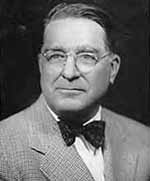


Branch
Rickey was one of the greatest executives in baseball history, and
also one of it's cheapest. Branch Rickey caught briefly in the
majors, later managing the Browns and Cardinals. He was also a
sanctimonious, hypocritical cheapskate, a man who would play fast and loose with
the rules and go back on his word when it suited him. That he was a successful
general manager for 42 consecutive years is
indisputable.
Yes, he helped to develop the farm system. Yes, he helped break the color line by bringing Jackie Robinson to Brooklyn in 1947. Rickey was a baseball genius, the greatest front-office man the game has ever known. His success as an executive is unparalleled.
Born in 1881 and raised on an Ohio farm, he never uttered an oath stronger than "Judas Priest" and did not drink alcohol. He was, for all his religious pretensions, a skilled manipulator of baseball's rules and people. He also had the gift to spot talent, and it didn't hurt that he was a shrewd trader. Rickey's motto was: "it's better to trade a player a year early instead of a year late." He was also a cartoonist's dream, a living caricature with bushy eyebrows and big jowls. He wore wire-rimmed glasses, favored bow ties, and smoked enormous cigars. Then there was his rhetoric. He loved using $5 words, and could he ever turn a phrase. "Luck is the residue of design," his best known saying, remains in vogue decades later. He acquired his nickname, "the Mahatma," in the 1940s, when Gandhi became a player on the world stage. The nickname was somewhat tongue-in-cheek, but it also shows the respect given to the man who had such a significant impact on the game. His tenure with the Cardinals proceeded smoothly until 1937, when Commissioner Kenesaw Landis investigated charges that Rickey was illegally signing and stashing players in his huge farm system. Landis ordered the release of 73 Cardinal farmhands from Rickey's "chain gang," and gave the players the right to sign with any team they wanted.
After Jackie Robinson's debut, Rickey raided the Negro Leagues as a new source of talent for his Dodgers. Effa Manley, owner of the Newark Eagles, accused Rickey of being a crook who did not want to pay out a dime for the players he signed away. Of the number of black players he signed through 1950, he paid out less than 5 percent of their total value to the clubs he signed them away from.
Rickey's parsimony became legendary. Johnny Mize actually believed that Rickey preferred to have his teams finish a close second so that he could cash in on a pennant-race gate without having to fork over pennant-winning raises to his players. Enos Slaughter once said that Rickey "would go to the vault to get change for a nickel." He was nicknamed, "El Cheapo" by New York sports writer Dick Young, who detested his miserly treatment of players. "The man was a cheap bastard" according to Dizzy Dean. Eddie Stanky described one negotiation with Rickey, "I got a million dollars worth of advice and a very small increase." Pittsburgh's Ralph Kiner recalled Rickey denying his promise for a raise after Kiner had won the NL home run title. Said Rickey, "We finished last with you and we can finish last without you." Dodger outfielder George Shuba was negotiated with Rickey and wanted an increase to $23,000. During the meeting, Rickey was summoned to another office for a phone call. As he waited, Shuba noticed a contract with Jackie Robinson's name on it for $21,000. When Rickey returned, Shuba agreed to take $20,000. Later, he found out that the Robinson contract was a phony and that Rickey's phone call was a setup.
While he was nickel-and-diming his players, Rickey was becoming a rich man. He had a deal with the Cardinals and Dodgers that gave him a 10-percent commission on every player sale. Bill Veeck once told of the time when Rickey once agreed to a deal over the phone, then went back on his word, and denied that the phone conversation had ever taken place!
Maybe the worst example of his cheapness was when his promising outfielder, Austin McHenry, died of a brain tumor in 1922. When asked if he would send flowers to the funeral, Rickey replied "flowers won't help to bring the poor boy back." Many of the players on the team felt that Rickey didn't want to dole out the bucks for the flowers.
Branch Rickey died in 1965 from complications from a heart attack, less than two weeks before his 84th birthday. He was inducted into the Hall of Fame in 1967